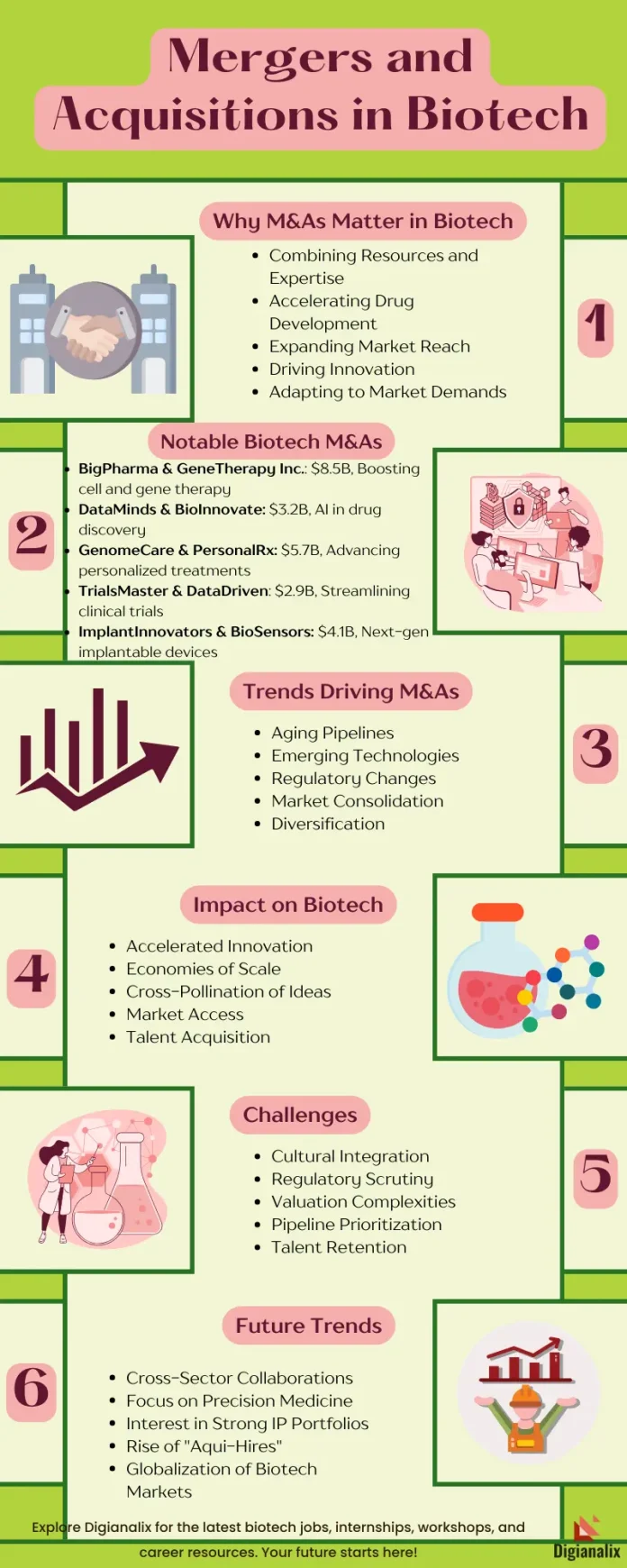“Exploring the Impact of M&As on the Biotech Industry!”
Hey biotech enthusiasts! 👋 Ready to dive into the dynamic world of mergers and acquisitions (M&As) in the biotech industry? Let’s explore how these strategic moves are reshaping the landscape and driving innovation in our field!
🔬 Why M&As matter in biotech
Mergers and acquisitions are more than just business deals – they’re catalysts for scientific breakthroughs and market disruptions. Here’s why they’re crucial:
- Combining resources and expertise
- Accelerating drug development pipelines
- Expanding market reach and product portfolios
- Driving innovation through synergies
- Adapting to changing market demands
🚀 Recent notable biotech M&As
Let’s look at some game-changing deals that have made waves in the industry:
- BigPharma acquires GeneTherapy Inc.
- Deal value: $8.5 billion
- Impact: Boosting cell and gene therapy capabilities
- AI-Bio merger: DataMinds and BioInnovate join forces
- Deal value: $3.2 billion
- Impact: Integrating AI into drug discovery processes
- Precision Medicine pioneers unite: GenomeCare and PersonalRx
- Deal value: $5.7 billion
- Impact: Advancing personalized treatment options
- CRO powerhouse formed: TrialsMaster acquires DataDriven
- Deal value: $2.9 billion
- Impact: Streamlining clinical trial processes
- Biotech meets MedTech: ImplantInnovators merges with BioSensors
- Deal value: $4.1 billion
- Impact: Developing next-gen implantable devices
💡 Trends driving biotech M&As
Several factors are fueling the current wave of mergers and acquisitions:
- Aging pipelines: Big pharma companies seeking new innovations
- Emerging technologies: Acquiring expertise in AI, gene editing, and more
- Regulatory changes: Adapting to evolving healthcare policies
- Market consolidation: Smaller biotechs joining forces to compete
- Diversification: Companies expanding into new therapeutic areas
🧬 How M&As are shaping Biotech’s future
These strategic moves are having far-reaching effects on the industry:
- Accelerated innovation: Combining R&D efforts to bring treatments to market faster
- Economies of scale: Reducing costs and improving efficiency in drug development
- Cross-pollination of ideas: Fostering creativity through diverse teams
- Market access: Helping smaller biotechs reach global markets
- Talent acquisition: Gaining access to top scientists and researchers
🤔 Challenges and considerations
While M&As offer exciting opportunities, they also come with challenges:
- Cultural integration: Merging different company cultures
- Regulatory scrutiny: Navigating antitrust concerns
- Valuation complexities: Accurately pricing biotech assets
- Pipeline prioritization: Deciding which projects to pursue post-merger
- Talent retention: Keeping key personnel during transitions
💼 What it means for biotech professionals
If you’re working in or considering a career in biotech, M&As can mean:
- New career opportunities and challenges
- Exposure to diverse projects and technologies
- Potential for professional growth and skill development
- Importance of adaptability in a changing landscape
🔮 The future of biotech M&As
Looking ahead, we can expect:
- More cross-sector collaborations (e.g., biotech-tech partnerships)
- Increased focus on precision medicine and rare diseases
- Growing interest in biotech companies with strong IP portfolios
- Rise of “aqui-hires” to secure top talent
- Continued globalization of biotech markets
What’s your take on the current M&A landscape in biotech? Are you excited about the potential for innovation, or concerned about industry consolidation? Share your thoughts in the comments below!
Stay informed about the latest biotech M&As and their impact on the industry by subscribing to our site. Let’s keep the conversation going and shape the future of biotech together!




